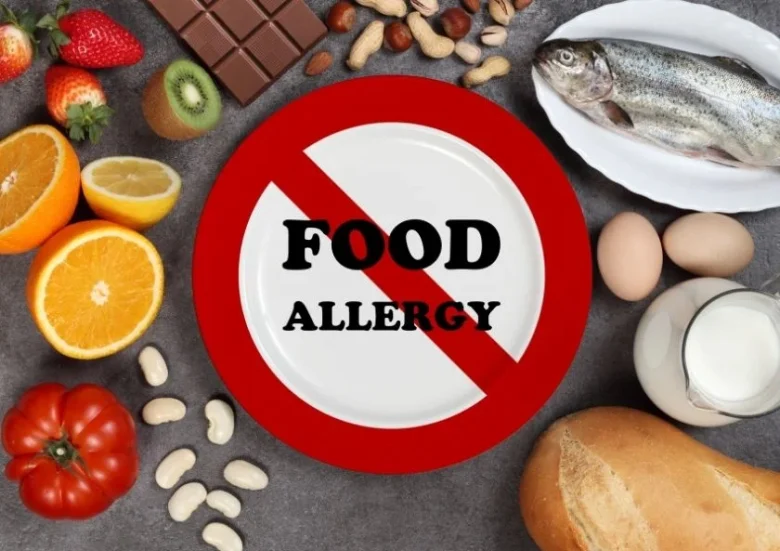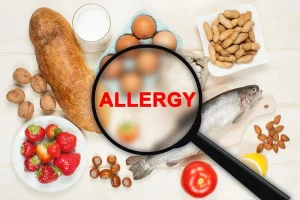Millions of people around the world have food allergies, which is a major health problem. These allergies occur when the immune system thinks a certain protein in food is harmful, causing an allergic reaction. Anyone with food allergies needs to understand their symptoms, how to diagnose them, and how to treat them. The purpose of this complete guide is to give people with food allergies all the information they need to deal with this difficult situation.
1. Common Food Allergens
Peanuts, tree nuts, milk, eggs, wheat, soy, fish, and shrimp are all common foods that can cause allergies. Most allergic reactions are caused by these eight foods. On the other hand, any food can cause a reaction. If you have a food allergy, you may feel nauseous minutes to hours after consuming the allergen. Symptoms can occur in many parts of the body and include hives, itching, swelling, stomach problems, breathing problems, and heart problems.
2. Symptoms of Food Allergies
Some mild symptoms of a food allergy include itching, hives, and mild swelling of the eyes, lips, or face. Although these symptoms are annoying, they are usually not life-threatening. Gastrointestinal symptoms such as feeling unwell, vomiting, stomach cramps, and diarrhea are also common. These symptoms occur when the allergenic food irritates the digestive system and causes inflammation and pain.
3. Signs of Breathing Problems
Lung symptoms are another common symptom of food allergies. A runny or stuffy nose, sneezing, coughing, wheezing, and difficulty breathing are some of the symptoms. Respiratory symptoms can be particularly frightening for people who already have asthma or other breathing problems because they can make these problems worse and have more serious consequences.
4. Anaphylaxis
Anaphylaxis is the most serious form of food allergic reaction and can be fatal. Multiple body systems can be affected by an allergic reaction and symptoms can occur quickly. These symptoms include difficulty breathing, swelling of the throat and tongue, fast or weak pulse, low blood pressure, dizziness, and loss of consciousness. Anaphylaxis requires immediate medical attention and epinephrine (a drug that can reverse the effects of a severe allergic reaction) should be given. If allergic reactions are not addressed immediately, they can cause serious problems or even death.
5. Discover Food Allergies
If you think you or your child may have a food allergy, you should consult an allergist or other medical professional immediately. A thorough history, physical examination, and certain tests, such as skin prick tests, blood tests, or oral food tests, may be part of the diagnostic process. To find the exact allergen and develop a good treatment plan, it is important to make an accurate diagnosis.
6. Managing Food Allergies
If someone is determined to have a food allergy, the best treatment is to stay away from the food that is causing the allergy. To do this, read food labels carefully to understand the risk of cross-contamination and to find out where allergens in prepared foods are coming from that you may not see. It is also important to teach teachers, family members, and caregivers about allergies and how to manage them.
7. Be Prepared for Emergencies
People with severe food allergies should always carry emergency medications such as antihistamines and epinephrine auto-injectors. If someone has an allergic reaction, he or she should have an emergency plan. The plan should include when and how to administer the medication and when to seek emergency medical attention. Family members, employees, and teachers should be informed of the plan so that everyone is prepared to take action in an emergency.
8. Stay Away from Allergies
The best way to prevent allergic reactions is to stay away from things that are known to cause allergic reactions. This means reading food labels carefully, understanding the risk of cross-contamination in the kitchen and other food preparation environments, and asking lots of questions about ingredients when eating out. It is important to discuss your child’s food allergies with school staff and other caregivers so that they understand and know how to prevent your child from being exposed to food allergies.
9. Educating Others
An important part of dealing with food problems is educating people about them. People in your life, such as family members, caregivers, teachers, and even friends, need to be aware of allergies and know how to detect and treat allergic reactions. For their safety and independence, it is also important to teach children with food allergies to speak up for themselves, pay attention to their symptoms, and seek help.
10. Living with Food Allergies
If you have food allergies, it’s important to be careful and prepared, but you can still live a healthy and busy life. People with food allergies can care for their condition by learning about food allergies, avoiding known allergens, and being prepared for emergencies. Getting help from your doctor, family, and friends is important to address problems caused by food allergies and live a safe and healthy life.
Conclusion
Food allergies can cause a variety of symptoms ranging from mild discomfort to severe reactions that can be fatal. To deal with them effectively and prevent serious reactions, it is important to understand the typical symptoms of food allergies and how to react to them. People with food allergies can live healthy, busy lives by working with their doctor, avoiding known allergens, and being prepared for emergencies. Be sure to ask your doctor or nurse for personal information and help in dealing with your food allergy.
FAQs
1. What should I do if my child has a mild food allergy?
For mild allergic reactions, you should stop eating foods that you think will make you sick immediately. Take over-the-counter antihistamines to relieve symptoms such as hives or itching. Monitor your child closely to see if symptoms worsen.
2. What should I do if someone has a severe food allergy?
If someone has a severe allergic reaction, especially if they have signs of an allergic reaction such as difficulty breathing, swelling of the throat, or a fast heartbeat, he or she should immediately use an epinephrine auto-injector and call 911 for emergency medical help.
3. How do you prevent food allergies from causing illness?
To avoid a reaction, look for the specific allergen, read food labels carefully, inform caregivers and teachers of your child’s allergies, and make sure your child has antihistamines and epinephrine auto-injectors on hand. Stay away from known allergens and consider the risk of cross-contamination.
4. How do you determine whether a food is allergen-free?
When reading food labels, look for specific allergens and look for cross-contamination warnings, such as “May contain” or “Processed in a concurrent processing facility.” Read more about the different types of allergens and their names.
5. Is there a way to treat food allergies?
There is currently no treatment for food allergies. To successfully manage this condition, people should stay away from known allergens, be prepared for a treatment reaction, and work with a healthcare provider to closely monitor the situation and ensure it is handled appropriately.
6. Do food allergies cause symptoms to appear later?
Food allergies can cause delayed symptoms that occur hours or even days after eating the allergenic food. Some of the symptoms include skin reactions, stomach problems, and breathing problems. Recognizing and treating subsequent symptoms can be more difficult.




